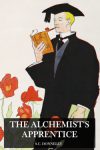
The black, imposing griffon loomed over the Apostate. It stood menacingly, frozen in a snapshot of pure menace; with its long, dagger-like talons reared upwards—as if ready to strike down at a moment’s notice if ever brought to life.
He quickly noticed that the insides of each talon were of a golden hue—unlike the rest of the sculpture, which was unanimously black and opaque. He guided his fingers along the golden streaks until they were interlocked between the griffon’s talons. He clasped tightly and twisted his wrists, which in turn rotated the griffon’s claws until his palms faced the ceiling. As he did this, the heads of the beast turned with a harsh grinding of stone until they both faced forwards.
There was a loud c’thunk that echoed from somewhere deep below where he stood. It was quickly followed by a series of mechanical lurches as gears and clockwork sprang into action within the sculpture. Then, suddenly, there was a snap of coils being released and the pedestal below the griffon began to rotate, rising as it did so. It was accompanied by a rapid clicking of gears and soon the pedestal became a mighty pillar that revealed a stone spiral staircase coiling around it as it snaked up from the ground, leading upwards into the now exposed ceiling where the twin-headed griffon had since disappeared into.
It stopped as loudly as it began and, after a moment’s hesitation from the Apostate, he climbed the staircase upwards—entering the newly revealed upper floor.
The plodding clop of hooves on cobblestone rang through the horse-drawn carriage as it travelled through the Primis District. Inside sat the Lady and Lord Domatium, both keeping to their own devices in complacent silence. Lord Béla held a long-stemmed pipe close to his lips, occasionally puffing out little wisps of smoke as he absentmindedly watched the steam-motors whizz pass the carriage window. Meanwhile, the Lady Arlette held a quill adorned with its own ink chamber, which she used to write a series of letters to them’ns and those’ns that were of no importance to anyone but herself. She did this under the streaking lights of the halogen streetlamps that brushed passed, taking time to chew on the feathered tip of her quill before quickly jotting down the latest gossip from tonight’s soirée. She had little worry of ill strokes while writing as the carriage was a surprisingly smooth ride. It was not a wheeled carriage like the ones of old, but instead, it was wheel-free—hovering an inch or so from the ground, propelled upwards by a constant gush of steam from below. Although impressive to behold, the steam-carriage was ill-suited for any road with more than a few bumps as any moderate jut in the ground had the chance of impacting the bottom and sending it toppling. But it was extravagant and expensive and, most importantly, bystanders knew who rode within by sight of the carriage alone.
The coachman steered the lone-horsed steam-carriage down a city street, which eventually opened up into a wide and sprawling avenue. A sweeping paint stroke of burnt oranges and subdued reds lined either as leaves teetering atop the looming trees anticipated the onset of autumn; accentuated with rich bundles of evergreen as the thickets of well-kept shrubbery coated the walkways and tree trunks like snug scarves, their colours muted by the dour blacks of night. The thrum of the machine city came here to die, leaving only the rustle of antsy foliage to dare break the golden silence.
They soon came to the end of the avenue, where they were met by an imposingly large wrought iron gate consisting of spires of black, accentuated by two monolithic stone piers on either side, topped with a stone globe each. The iron fence continued outwards in each direction, disappearing into the dense trees. In the distance, beyond the ornate fountain which rested near, was the Del’Mar mansion—sat like a gothic grove hidden amongst the brass forest.
The gate, willed by some unknown means, opened for the carriage and they continued onwards into the Del’Mar estate.
There was a satisfying crunch of gravel from quickened footfalls as a lone guardsman ran across the courtyard and towards the just settled carriage at the entryway steps of the Del’Mar estate.
“My lord,” the guard called out to Béla, who was currently helping Arlette out of the carriage, “Major Roth sends his immediate demands for your assistance.”
“Major Roth?” Béla replied scornfully. “And who is he to demand anything from me. And for what purpose?”
“There’s been an intruder, my lord,” the guard replied nervously.
“By God’s fall, eliminate him then! Surely you men are capable of that—without making such, demands.”
“But sir—it’s the Bronze Apostate.”
Béla’s eyes grew wide for an instant, and then he quickly regained his composure.
“I see,” he said, and then turned to Arlette. “I’m afraid I must ask that you stay at your sister’s residence in the Daemon District. I shall come for you when this matter is settled.”
Arlette kissed him on the cheek and replied, “Of course—be safe, my love.”
Béla smiled and helped her once again into the carriage. He then called out to the driver and said, “Be sure that she arrives there safely, or I shall see to it personally that your head is removed.”
“Of course, my lord,” The coachman called out, seemingly unphased by the threat—he was surely used to them by now. Then, by a whip of the reins, steam began to bellow out from below the carriage as it slowly rose off the ground. The horse gave an obstinate neigh, which irked another whip of the reigns from the coachman that finally convinced the horse to begin pulling the carriage away from the Del’Mar estate.
“Let us go and end this once and for all,” Béla demanded with a grievous tone.



